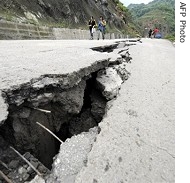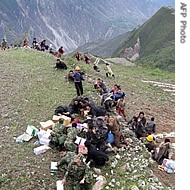ACTUALITE NUCLEAIRE
2008
mai
Chine: séisme du Sichuan (voir suite en juin)
12 mai
|
Le 12 mai à 14h28 heure locale, un puissant
séisme d'une magnitude de 7,8 sur l'échelle de Richter est
survenu à environ 80 km à l'ouest de Chendgu, capitale de
la province du Sichuan en Chine. Depuis cette date, l'Autorité de
Sûreté Nucléaire est en contacts réguliers avec
NNSA (National Nuclear Safety Administration), l'Autorité de sûreté
nucléaire chinoise en charge du contrôle de la sûreté
et de la radioprotection des installations nucléaires civiles.
Magnitude = 7,9 à 14h28 heure locale: http://www.voanews.com Nearly 15,000 People Dead From China Earthquake By Stephanie Ho Beijing 14 May 2008 Rescue operations are continuing in southwestern China, as the government air lifts relief supplies to the closed-off area near the epicenter of a huge earthquake that struck Monday. The 7.9 temblor is reported to have killed nearly 15,000 people. From Beijing, Stephanie Ho reports that tens of thousands of others are still missing or believed to be buried under debris. Large piles of rubble. Broken cement slabs. Twisted metal tubes. Homeless people, heartbroken and wailing. This is just some of what the earthquake left behind, as described by eyewitness Daniel Schearf, China correspondent for Global Radio News. He said he could hear frustration in the voices of people he talked to in Dujiangyan, Sichuan Province. "It is a pretty bad scene" said Schearf. "It Is a pretty emotional scene." He said even brief moments of joy, when rescuers successfully recovered a survivor, turned tense, when people with family members still missing pleaded with workers to stay. "The one survivor, when they pulled him out, there was some clapping and cheering from the crowd," said Schearf. "But that was quickly replaced by cries of help, for emergency workers to stay here and try to find any other people who might be buried under the rubble." |
State television showed Chinese Premier Wen
Jiabao surrounded by weeping earthquake survivors in what appeared to be
a countryside community in Sichuan.
There is still a long way to go in the future, he says. As long as we have people alive, we can rebuild our homes. The quake triggered landslides that made many mountain roads impassable, so the Chinese government has begun airlifting badly needed relief supplies to some of the worst hit areas. The People's Liberation Army carried out what it says is its largest airlift ever, bringing more than 11,000 troops, equipment and supplies to army headquarters in Sichuan province. Red Cross Society of China Vice President Su Juxiang says the response from ordinary Chinese has been overwhelming. She says the Red Cross has nearly $44.5 million, in cash and in kind donations. China also has welcomed foreign offers of money and material aid, but says it does not want international rescue teams at this time because conditions on the ground are still so bad. At the U.S. Embassy in Beijing, U.S. Ambassador Clark Randt announced a $500,000 contribution from the United States. "This money is to be used to assist the victims of this devastating event, to help them through this traumatic period, and hopefully get them back on their feet as soon as possible," said Randt. The U.S. donation is the first contribution to the International Federation of Red Cross's initial appeal of $10 million for China quake relief efforts. Chinese state media report that a major refined oil pipeline has resumed operation, after a 22-hour suspension. In Dujiangyan, authorities are looking into cracks and other damage to the Zipingpu dam and reservoir. Meanwhile, the France-based Institute for Radiological Protection and Nuclear Safety expressed concern over possible damage to nuclear facilities that were located near the quake's epicenter. Wenchuan, where the quake struck, has a large ethnic-Tibetan population. It is also home to the Wolong Nature Reserve, China's largest breeding center for giant pandas. The Wenchuan earthquake is shaping up to be China's second deadliest quake in recent history. Number-one is still the 1976 Tangshan earthquake, in which at least 250,000 people died. 
Huge crack seen in center of mountian road as survivors make their way out of Wenchuan County, 14 May 2008 
Survivors gather to wait for a Chinese military helicopter bringing in supplies in Wenchuan, the epicenter of the earthquake that struck southwest China's Sichuan province, 14 May 2008 Document .pdf de l'IRSN avec cartes détaillées: |